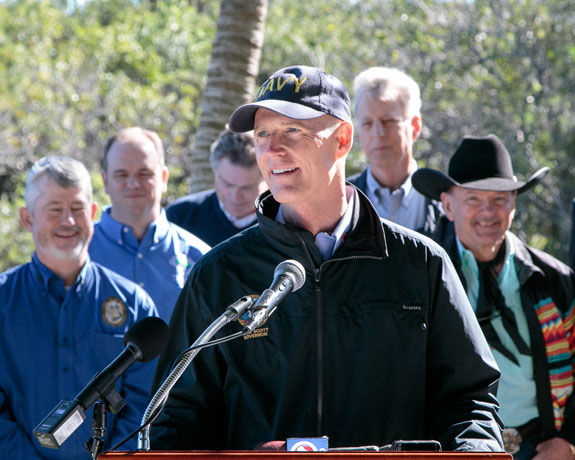
Gov. Rick Scott, pictured here in the Everglades, has denied that he prohibits DEP employees from using the terms “climate change” and “global warming.” (Photo courtesy of Gov. Scott.)
By Trevor Aaronson
Florida Center or Investigative Reporting
The response to Tristram Korten’s report revealing that state Department of Environmental Protection employees were ordered not to use the terms “climate change” and “global warming” was something of a perfect storm for social media — a controversial governor, science, and politics mixed together combustibly in our weird state.
The social media response has been enormous, and in some cases resulted in an oversimplification of the story. Florida’s unofficial policy not to use “climate change” and “global warming” is nuanced and porous, as Korten’s well-sourced story revealed. But the boiling down of the story on social media has brought out some critics.
Mollie Hemingway of The Federalist declared unequivocally: “No, Florida State Government Did Not Ban The Term ‘Climate Change.’ ” Hemingway wrote:
A search of the Florida DEP web site for the term “global warming” yields, according to the site, 244 results. And, according to the site, another 1,640 for “climate change.”
Tampa Tribune columnist Tom Jackson used Hemingway’s Internet sleuthing as the basis for criticizing the diligence of FCIR’s reporting while, let’s note, misspelling the name of the FCIR staffer who wrote the story (it’s Korten, not Kortan). Here’s some of Jackson’s criticism:
With the exception of spokes-people (sic) for the governor who deny such a ban exists, Kortan’s (sic) sources are almost exclusively former state employees who have gone on to other work supporting the positions of the environmentalist left. It’s up to the reader to decide whether the descriptive “disgruntled” would have been applied if the ex-staffers were complaining about a Democrat’s disagreeable commands.
Let’s address the criticism with a simple FAQ:
Q. Hey, wait a minute there! I just searched “climate change” on DEP’s website and got a bunch of results. What gives?
A. The vast majority these documents pre-date Gov. Rick Scott’s tenure in office. Others refer to previous reports. If a pre-Scott DEP report included “climate change” in the title, the reference to that report will result in a “climate change” reference in a more recent report. The unofficial policy not to use “climate change” does not appear to apply to the titles of previous reports. Other organizations, including agencies that are independent of DEP, have their documents hosted on DEP servers, and in some of their reports, you’ll find “climate change.” An example is the Acquisition and Restoration Council, whose agendas (here’s one, for example) can be found on DEP’s website. Some of these agendas include “climate change” as part of recurring line item to attempt to acquire and/or conserve lands most affected by climate change — an effort that began before Scott took office. That initiative is run by the Florida Natural Areas Inventory, a nonprofit administered by Florida State University.
Q. But wait, there are other references!
A. Yes, there are. Korten’s reporting showed that the policy was a verbal one whose consequences for violating it were unclear. This fact, coupled with apparent mistakes in word-scrubbing, have created an unofficial censorship system that is porous. Korten addressed this in his original story:
One example is the Florida Oceans and Coastal Council’s Annual Research Plan, put together by DEP and other state agencies. The 2009-2010 report, published the year before Scott was elected, contains 15 references to climate change, including a section titled “Research Priorities – Climate Change.”
In the 2014-15 edition of the report, climate change is only mentioned if it is in the title of a past report or conference. There is one standalone reference to the issue at the end of a sentence that sources say must have slipped by the censors. “It’s a distinct possibility,” said one former DEP employee.
Q. How can you say there is a policy not to use the terms if Scott and his spokespeople deny it?
A. As Korten noted in his original story, spokespeople for Scott and DEP deny that there is a policy. They may be technically correct, as we have not found evidence of a written policy. FCIR interviewed multiple people from offices throughout the state who told the same story: Their superiors told them that using the terms “climate change” and “global warming” would not be good for their state careers. Yes, the employees FCIR named are no longer with the state. Korten made that clear in his original story. He also contacted current employees who, as you might suspect, didn’t want to talk for fear of losing their jobs. No one, except for Scott’s spokespeople, denied the existence of this policy. Yesterday in Miami, Gov. Scott told reporters asking about FCIR’s story: “That’s not true.” Beyond these assertions, the governor and his staff have not provided any evidence that this unofficial policy is not in effect. Assertions without supporting evidence are so far all the news media are receiving from the Scott administration. As an example, here’s what The Guardian reported Monday:
A DEP spokesperson backed the denial from Scott’s office on Monday in an interview with the Guardian.
“It is simply not true that there is a policy prohibiting words being used,” said Luke Strickland, the spokesman. “I can’t speculate on why former employees and people are saying that. But I can tell you that it’s simply not true, there’s no policy prohibiting the use of the words climate change or words like that.”
Asked to provide examples of the use of those phrases in DEP material, Strickland said he would send some. But then he did not.
